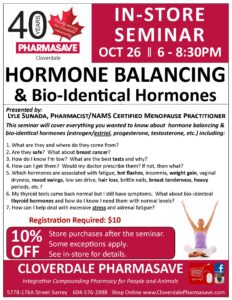Hormonal imbalances can be a significant contributor to premature aging. During menopause, the ovaries produce less estrogen and progesterone, leading to a range of symptoms such as hot flashes, mood swings, brain fog, low libido, vaginal dryness, dryer skin/wrinkles, and increased susceptibility to osteoporosis.
Similarly, in men, the age-related decline in testosterone levels, known as andropause, can result in fatigue, reduced muscle mass, abdominal weight gain, brain fog, and sexual dysfunction. These imbalances not only impact quality of life but also increase the risk of age-related diseases. Additionally, imbalances in stress-related hormones like cortisol can accelerate the aging process, leading to increased inflammation and oxidative stress.
In the Anti-Aging community, hormone replacement therapies (HRT) are believed to counteract the effects of hormonal imbalances associated with aging. HRT involves the administration of bioidentical hormones to restore hormone levels to a more youthful state. In women, estrogen and progesterone replacement therapy can alleviate menopausal symptoms and vaginal dryness and reduce the risk of osteoporosis. Similarly, testosterone replacement therapy in men can enhance muscle mass, energy levels, and sexual function.
However, HRT is not without controversy. It comes with potential risks, including an increased risk of breast cancer. Therefore, it is essential to consider the individual’s health status, risk factors, and preferences when considering HRT as an anti-aging strategy. Close monitoring and personalized treatment plans are crucial for optimizing benefits while minimizing risks. A good starting point can be to do a DUTCH test.
A DUTCH test, which stands for Dried Urine Test for Comprehensive Hormones, is a type of hormone test that measures the levels of various hormones and their metabolites in your body using dried urine samples collected several times throughout the day and night over a 24-hour period. It measures the following:
1. Sex Hormones: It measures hormones like estrogen, progesterone, DHEA, and testosterone, as well as their metabolites, which can provide insights into hormone production and metabolism.
2. Adrenal Hormones: It assesses adrenal function by measuring hormones like cortisol and cortisone, which are involved in the body’s stress response.
3. Melatonin: This hormone is involved in regulating sleep-wake cycles and is often included to assess sleep-related issues.
4. Neurotransmitter Metabolites: Measuring neurotransmitter metabolites can provide insights into mood and mental health.
It’s important to note that the DUTCH test is often used in functional medicine and integrative medicine practices to guide personalized treatment plans. If you’re considering this test, it’s advisable to consult with a healthcare provider who is experienced in interpreting the results and can recommend appropriate interventions if any hormone imbalances are detected.
For a better understanding of hormone imbalances consider attending my upcoming Hormone Balancing Seminar held every few months (next seminar Oct 26, 2023). Click HERE to register online, or call 604-576-2888 to sign up.





